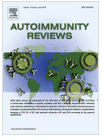 In western countries, the slope of autoimmune disease (AD) incidence is increasing and affects 5-8% of the population. Mainly prevalent in women, these pathologies are due to thymic tolerance processes breakdown. The female sex hormone, estrogen, is involved in this AD female susceptibility. However, predisposition factors have to act in concert with unknown triggering environmental factors (virus, microbiota, pollution) to initiate AD. Individuals are exposed to various environmental compounds that display endocrine disruption abilities. The cellular effects of some of these molecules may be mediated through the aryl hydrocarbon receptor (AhR).
In western countries, the slope of autoimmune disease (AD) incidence is increasing and affects 5-8% of the population. Mainly prevalent in women, these pathologies are due to thymic tolerance processes breakdown. The female sex hormone, estrogen, is involved in this AD female susceptibility. However, predisposition factors have to act in concert with unknown triggering environmental factors (virus, microbiota, pollution) to initiate AD. Individuals are exposed to various environmental compounds that display endocrine disruption abilities. The cellular effects of some of these molecules may be mediated through the aryl hydrocarbon receptor (AhR).
Here, Rozen LePanse’s team, from the Institute of Myology, reviews the effects of these molecules on the homeostasis of the thymic cells, the immune tolerance intrinsic factors (transcription factors, epigenetic marks) and on the immune tolerance extrinsic factors (microbiota, virus sensibility).
This review highlights the contribution of estrogen and endocrine disruptors on the dysregulation of mechanisms sustaining AD development.
